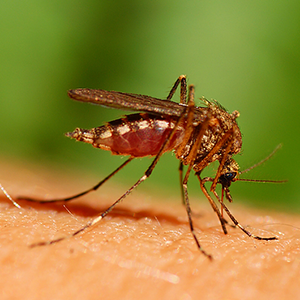
West Nile Virus Confirmed in Spokane County Mosquitoes
Individuals urged to control mosquito populations, prevent exposure to bites
For more information, contact Kim Papich, SRHD Public Information Officer 509.324.1539 or kpapich@srhd.org
SPOKANE, Wash. – Spokane Regional Health District (SRHD) today reported laboratory confirmation of West Nile virus (WNV) in two separate mosquito samples from Spokane County. While no cases of WNV have been identified in Spokane County humans, birds or horses, early- to mid-August typically marks the first onset of symptoms in these groups. Identification of WNV-positive mosquitoes in the county provides an opportunity for people to proactively control mosquito populations and prevent exposure to bites.
“While we expect mosquito populations to dwindle as the weather gets cooler and the days get shorter, continued warm temperatures will contribute to prolonged mosquito activity and thus, prolonged risk for acquiring WNV. It only takes one bite to acquire WNV,” said Sandy Phillips, technical advisor for SRHD’s Zoonotic program. “Standing water is a breeding ground for mosquitoes. People can afford themselves a level of protection by draining anything around the home that holds water, as well as preventing exposure to bites.”
Additionally, smoke from wildfires does not impact mosquito levels or behavior—another reason to remain vigilant.
West Nile virus is spread through the bite of an infected mosquito. Although less than 1 percent of people who become infected with the virus will develop severe illness, some are at higher risk of severe disease, including those who are 60 years of age or older, those with compromised immune systems, or those with underlying medical conditions.
In 2017, eight Spokane County residents were confirmed to have West Nile virus compared to three in 2016. Otherwise, most people infected with WNV are asymptomatic—80 percent of people experience no symptoms—therefore it is believed the actual disease incidence is substantially underrepresented.
To further avoid mosquito bites, remember to ‘drain, dress and use repellent’:
- Reduce mosquito breeding sites around your home. Twice weekly, drain and routinely empty anything that holds water, such as gutters, pet bowls, tires, bird baths, etc. Keep water moving in ornamental ponds by recirculating water or by installing a fountain.
- Dress in long-sleeved shirts and long pants where needed, especially at dawn and dusk when mosquitoes are most active.
- Use properly fitted door and window screens and stay indoors around dawn and dusk.
- If outdoors, use a mosquito repellent if in areas where mosquitoes are active.
Symptoms of West Nile virus include headache, fever, neck discomfort, muscle and joint aches, swollen lymph nodes, and a rash. Symptoms usually develop two to 14 days after being bitten by an infected mosquito. Those with more severe symptoms—such as severe headache or confusion—should seek medical attention.
Washington State Department of Health (DOH) offers maps and statistics to indicate where West Nile virus is occurring elsewhere in the state. Nationally, nearly every state and the District of Columbia report West Nile virus infections in people, birds, or mosquitoes in 2017.
There is currently no vaccine available for humans, but there is one for horses. Approximately one in three horses that become ill with the virus will die. One horse in the state has been confirmed to have WNV in 2018, in Grant County. During previous years in Spokane County, six horses were confirmed to have the virus in 2017 and eight in 2016. Individuals with horse-specific questions should speak with their veterinarian about West Nile virus vaccine or seek more information from the WSDA website.
The health district also offers its campaign Bring It, Summer Pests!, srhd.org/bringit, which features simple landscaping tricks and tips to protect a home’s exterior, giving individuals useful tools for managing mosquitos and other summer pests and their associated diseases.
If a resident finds a dead bird, they should be aware some birds may die from WNV. Regardless of the cause of death, dead birds should not be handled with bare hands. Information about dead birds, West Nile virus prevention, and mosquito repellents can all be found at www.srhd.org by searching “West Nile virus.” More information and prevention tips are also available on DOH’s West Nile virus website.
Become a fan of the health district on Facebook to receive local safety and wellness tips. You can also follow us on Twitter @spokanehealth.
